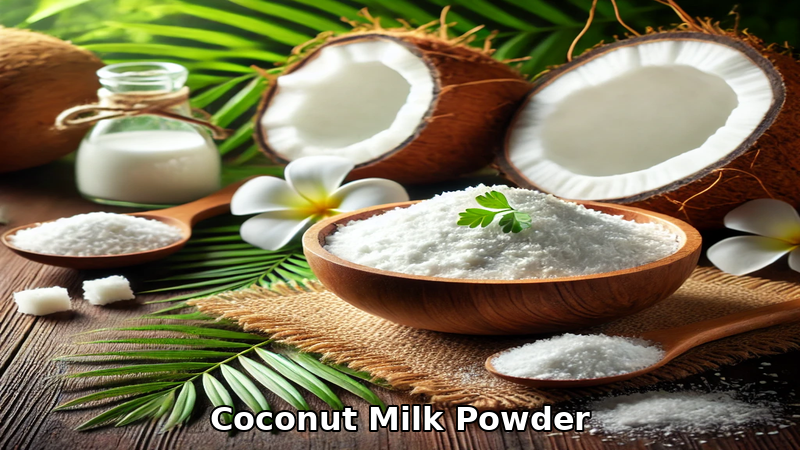Int'l : +1(646) 832-2886 | query@kbvresearch.com
Int'l : +1(646) 832-2886 | query@kbvresearch.com
Published Date : 20-Dec-2024 |

Coconut milk powder is derived from the meat of mature coconuts, which is processed into a fine powder through a method known as spray drying. This process involves extracting the liquid coconut milk and then dehydrating it to create a shelf-stable product that can be easily reconstituted with water when needed.
The versatility of coconut milk powder allows it to be used in a variety of dishes, from soups and sauces to desserts and beverages. It serves as an excellent dairy alternative for those who are lactose intolerant or following a vegan diet.
The global coconut milk powder market is on an upward trajectory. According to industry reports, the market size is expected to reach $140.8 million by 2031, growing at a compound annual growth rate (CAGR) of 9.7% during the forecast period.
This growth can be attributed to increasing consumer awareness regarding health benefits associated with plant-based diets and rising demand for dairy alternatives.
The production of coconut milk powder involves several steps:
This method not only preserves the flavor and nutritional content of the coconut but also extends its shelf life significantly.
Coconut milk powder is rich in nutrients, making it a valuable addition to any diet. The nutritional values provided are typically for 100 grams of coconut milk powder. A typical serving contains:
The high-fat content primarily consists of medium-chain triglycerides (MCTs), which are known for their potential health benefits, including improved metabolism and weight management.
Nestlé S.A., headquartered in Switzerland, is one of the largest food and beverage companies globally. They produce a variety of products including dairy alternatives like coconut milk powder under their brands. Nestlé focuses on innovation and sustainability in its sourcing practices.
Associated British Foods PLC operates across various sectors including food production and retail. Their subsidiary brands offer coconut milk powder that caters to both consumer markets and food service industries. The company emphasizes quality control and ethical sourcing.
Danone S.A., another major player in the food industry, has ventured into plant-based products extensively. With a commitment to health-focused offerings, Danone's range includes coconut milk powder that appeals to health-conscious consumers looking for dairy alternatives.
McCormick & Company specializes in flavour solutions and spices but also offers coconut milk powder as part of their product line. They focus on enhancing culinary experiences while ensuring high-quality standards in their products.
The coconut milk powder market has seen several noteworthy trends recently:
Companies are increasingly experimenting with different formulations to enhance flavor profiles and nutritional content.
Many brands are focusing on sustainable sourcing practices to meet consumer demand for environmentally friendly products.
The rise of e-commerce has made it easier for consumers to access coconut milk powder from various retailers, increasing market penetration.
Coconut milk powder can be utilized in numerous ways:
Coconut milk powder stands out as a versatile ingredient that caters to various dietary needs while providing unique Flavors and textures in cooking. With its growing popularity reflected in market trends and consumer preferences, it’s clear that this product will continue to thrive in kitchens around the world.
As we look ahead, innovations in production methods and increased awareness about plant-based diets will likely drive further growth in this sector. Whether used in traditional recipes or modern culinary creations, coconut milk powder remains an exciting ingredient with vast potential.